Maj. Danny Sjursen: Dissent Is Patriotic (Audio and Transcript)
The Truthdig columnist and U.S. Army officer tells Truthdig Editor in Chief Robert Scheer that U.S. foreign policy since 9/11 makes us less safe.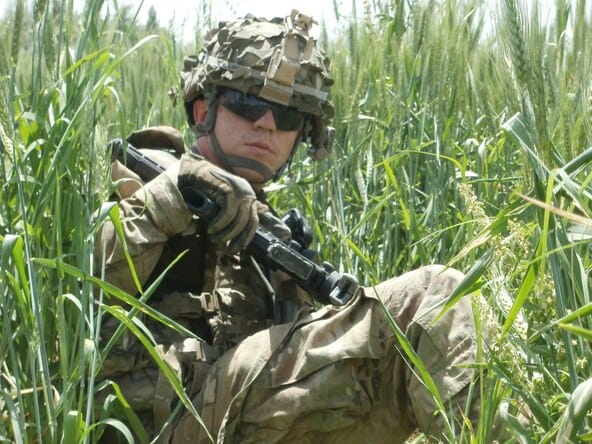 Maj. Danny Sjursen. (Courtesy of Danny Sjursen)
Maj. Danny Sjursen. (Courtesy of Danny Sjursen)
Listen to the full interview in the player above, and see the full transcript below. Find past episodes of “Scheer Intelligence” here.
—Posted by Emily Wells
Danny Sjursen’s views, expressed in an unofficial capacity, do not reflect the official policy or position of the Department of the Army, Department of Defense, or the U.S. government.
Full transcript:
RS: Hi, this is Robert Scheer with another edition of Scheer Intelligence, where the intelligence comes from my guests. And in this case, it’s Danny Sjursen, spelled S-j-u-r-s-e-n. And I’m spelling it ’cause I want you to read any piece this guy writes. You can read him at Truthdig, where he’s doing actually a revised history of America along the lines of sort of Howard Zinn’s attempt. He writes for The Hill, he writes for a lot of publications. And what makes it so interesting is he’s writing about America’s wars, historically and the current ones having experienced these wars; he’s an active duty major now in the military, he’s about to leave. And he’s taught at West Point, he’s been an active duty soldier in Afghanistan and Iraq. So let’s just begin with your background. In one of the pieces you wrote for Truthdig, you talked, you were writing really about our fascination with guns and gun violence, domestically here. And you pointed out that you’re no stranger to guns; you said you strapped on a pistol when you were 17. Let’s begin with that, you were a kid in Staten Island, New York, and you what, decided to join the military?
DS: That’s right. Obviously gun control is pretty severe in New York, so I certainly didn’t strap on a pistol until I got up to West Point, which is about 90 minutes north of the city. But you know, I had decided pretty early on I wanted to try to get out of the neighborhood, do something exciting, maybe something romantic, and the Army seemed like a really good way to do that. I was just going to enlist initially, right out of high school, but my father sort of convinced me, you know, he said you’ve got good grades, you did well on the SAT, why don’t you consider West Point. Of course I thought to go to West Point you had to be a congressman’s kid or some rich guy, so I thought I had no shot. But I applied anyway; sure enough, I got in, whether for better or for worse. Walked up the stairs of my apartment, my walk-up in Staten Island, and you know, walked in and my mother was crying and all her friends were clapping ‘cause they had illegally opened my mail, I think that was a federal crime. And so they got to see the acceptance letter before I did. You know, a few months later, July 2nd, 2001, I was up at West Point, did my basic training, spent four years at the military academy. Graduated fairly high in my class. From there it was Fort Carson, Colorado; deployment to Baghdad, Iraq during the surge, 2006 through 2007; I was there for 15 months. Following that I moved to Fort Reilly, Kansas, where I commanded a cavalry troop, which is really a reconnaissance, reconnaissance element, and took that troop to Kandahar, Afghanistan. That was 2011 and ‘12. About to get out of the Army at that point; pretty much every point in my career I was always on the verge of getting out, but I was accepted to go back and teach history at West Point, which I actually had applied to do from Afghanistan. Which you can imagine was relatively difficult, trying to get to a fax machine and get all of my transcripts in to the graduate schools. But I did get my graduate degree on the Army’s dime, taught two years in the history department at West Point. Now I’m stationed at Fort Leavenworth, and in the next few months I’ll be getting out of the Army, and I’m going through some sort of medical evaluations and everything now just to make sure that I get my benefits. And then from there on, I really want to do this full time. You know, writing, speaking as much as possible, and it’s time for a new phase of my life. I’ve been doing this for 17 years; it’s been absolutely crazy, and not what I expected. Because you have to remember, I joined up in July 2001, two months before 9/11. Quite frankly, I thought I’d get to go to Germany, if things got really crazy maybe I’d end up in Kosovo. I certainly wasn’t expecting a forever war, which is what I turned out to have signed up for.
RS: Yeah, and I should mention that, you know, you’ve written already a considerable body of work, while you’ve been on active duty. I was going to ask you how come the military allows this, or is this a new policy? You wrote a book called Ghost Riders of Baghdad: Soldiers, Civilians, and the Myth of the Surge. The military likes to present it, as do many politicians, that the surge was a great success. And your writing, I dare say, it’s remarkable. Remarkable, because we’ve come to see war as a kind of video game; we don’t have a draft, and you know, people throw it around, concepts and so forth. And your writing just, you know, has this authority of being there, and demystifies it; at the same moment, talks about the good, the bad, and the ugly. And really brings a challenge to our foreign policy that I find personally compelling; that’s why we run it at Truthdig. But maybe you could summarize your own trajectory and what you’ve learned in this experience.
DS: You mentioned how I’m still on active duty, and I actually should lead off before I get into any of my opinions by saying that you know, so long as I’m on active duty for the next four to six months, I actually have to start pretty much every article and every interview by saying that these are my unofficial opinions and not based on the positions or policies of the Department of Defense, Department of the Army, West Point, or anything else I’ve been associated with. By saying that I protect myself from any, you know, legal problems within the active duty military. That being said, let us not forget that the sort of subversive things that I write, and the dissenting that I do on U.S. foreign policy, it’s not winning me friends in the military. It certainly, if my goal was to be a general or if I was really trying to climb that greasy pole to the top of the military, this would be a bad idea. So you know, on one hand, the military does allow a decent amount of dissent. I mean, I’m not doing anything illegal, and as long as I have my disclaimer, I’m OK. At the same time, if you look at the top ranks of the military, very, very rarely is there much dissent. The system isn’t built for that. The system is bureaucratic, it’s hierarchical, and it’s built around pleasing your boss, whatever that takes. And it’s really a system where the generals select their own, which is a formula for sycophancy and nepotism rather than critical thinking. So for me, this has sort of become a mission; I would be remiss if I didn’t admit that I have an axe to grind, and that is that I believe the United States’ foreign policy has been unmoored and drifting away from anything close to sober strategy for coming up on 17 years now. I think the post-9/11 wars have been an absolute tragedy, probably the greatest foreign-policy disaster since the Vietnam War. Remarkably similar consequences for America and for the republic. And I truly believe we are less safe because of American foreign policy and American militarism in the world since 9/11. Beyond that, I feel that based on civil liberties being sort of weakened, and the increasing power of an imperial presidency, I think the republic is also in peril. So I felt the need while I was in graduate school to write my book, which is part memoir and part critical analysis of the war, Ghost Riders of Baghdad. And that was really my first experience dissenting. I guess I got, I got a taste for it and I couldn’t stop. And quite frankly, I’m mentally healthier, to the extent that I can be, when I’m writing, when I’m researching, and when I’m trying to point out some of the flaws in U.S. foreign policy, which I think are significant.
RS: You know, it’s interesting, there’s a long tradition of people with military experience speaking out. They usually do it after they’ve been in the military, and you are, as you point out, active duty. But you know, you’re really talking about, and your articles talk about it all the time, you’re talking about being loyal to the troops that you led as a major, some of whom got killed. You’re talking about your concern about their families, the waste of their lives, the impact on the country. And so it’s in an honorable tradition of patriotism. And my favorite general, and well, this, maybe I have a naive view, I’m waiting for your, the chapter you’re writing on your history, when you get to George Washington. But he’s the one who in his farewell address warned us about what he called “the impostures of pretended patriotism.” And the reason the Founders wanted a civilian army, and were wary of a permanent military presence, and wary of an imperial presence, is they thought it would destroy the idea of a republic. So your writing is really comfortably within that tradition, is it not?
DS: I like to think that it is. I’m concerned about the ideas of patriotism that are so shallow, as we see today, where patriotism is standing on the 50-yard line with your hand over your heart, and waving a flag. I think that it needs to be much deeper than that. If we truly want to be patriotic, we have to want the best for our country, both internally and in terms of its role externally. It starts with George Washington, who in his farewell address made it very clear he wanted us to stay out of European interventions or global interventions. You could follow that track along even further. You know, Dwight Eisenhower, who even though he was a republican–of course he couldn’t get into the Republican Party now; he would be a liberal–but you know, he warned against the military-industrial complex. He was a West Pointer, five-star general, war hero, and he’s warning us about the military-industrial complex. Some years before him there was a Marine, major general, two-time Medal of Honor winner; that’s extraordinarily rare in U.S. history. And his name was Major General Smedley Butler. He gets out of the Marine Corps and starts writing about his experiences policing the Caribbean and Latin America, and he says you know, I was nothing but a high-paid muscle man for Wall Street. And he said, “War is a racket.” So there is a tradition of military dissent. It’s less common now. And I think the reason for that is that now we are an all-volunteer, professional military. And the all-volunteer, post-Vietnam, professional military is increasingly divided and diverging from the population at large. When we took the draft away, when we took conscription away, when we got rid of the idea of the citizen soldier, we made it much harder to dissent. And you see very, very few active duty officers dissenting against the perpetual wars we’ve been waging for the last 17 years. I think that’s a tragedy, by the way.
RS: Well, one of the interesting things is that, is dissenting while you’re still in, which is what you have done effectively. And you make an interesting point in terms of your own trajectory. You’ve seen war, you’ve fought in it, you’ve led men into combat, some of whom have died. And then you found yourself teaching, or I forget exactly the trajectory, but you were teaching history, American history at West Point. And you realized, there’s only one, what, one semester devoted to this history. Right? And you felt a need to examine it more critically. And you do make a point in your writing, we shouldn’t underestimate the academic integrity of West Point. And you know, that there are a lot of good folks up there. Just, you know, in terms of your own education at West Point and going back as a teacher, and yet you find yourself in these wars, what is the connection of truth, accuracy, myth to all of that?
DS: Well, West Point, a lot of people might assume, is just an assembly line of automatons. And don’t get me wrong, there are some flawed instructors at West Point, and there are some flawed policies, and there are institutional weaknesses. But overall, it’s also a university, and probably on par with most of the Ivy Leagues. There’s about ten to 20 percent of the instructors are civilian PhDs, and the military guys that tend to go back there are a little smarter than your average bear. A little bit more critical-thinking folks. Not always, and it depends on the department. But I’ll give you an example. When I was getting ready to go teach at West Point, and I let it be known to my chain of command that that’s what I wanted to do, I was warned off against doing that by two or three different colonels who said oh, you’ll wreck your career, you don’t want to do that, you don’t want to go back and be an academic at West Point. You want to stay in the muddy boots army, you want to climb that greasy pole. But I knew that I wanted to get on the academic side; I needed a break, I needed a break from the wars. I left Afghanistan and I was ensuing graduate school just a few months later. As I began teaching American history, it dawned on me that my cadets, even though they come from all 50 states, all the territories, Samoa, Puerto Rico, they had a remarkably similar view of American history. And it was this overly patriotic, exceptionalist myth. And I took it upon myself, probably because of my own bias but also because of my scholarly credentials, to challenge that myth. To make them think critically about the role of the United States and the United States military throughout its entire history, up to and including today. Because I don’t want people walking into the military who aren’t willing to question authority, who aren’t willing to question orders, who aren’t willing to take a hard look at what it is that America is doing in the world. That became a personal mission. I had a decent amount of success with the students; most of them were excited by my motivation that I brought to the classroom. But quite frankly, I got a lot of pushback as well. And that’s OK, ‘cause that meant we had debates, and I got these kids thinking, and it wasn’t a singular echo chamber like it often is in the military. Quite frankly, even here at Fort Leavenworth, when I was in the Command and General Staff College, you know, if there were 15 of us in the classroom, 12 to, 12 to 14 people in that classroom were going to be pretty far to the right and pretty much enamored with American exceptionalism. I wanted to break that and get rid of the echo chamber.
RS: So let’s talk about American exceptionalism a bit, ‘cause that’s sort of the big theme of your writing now. And for people who aren’t familiar with your byline, they’re going to read it a lot, Danny Sjursen, an active duty member of the armed forces, now Major, who has witnessed war and also has a deep abiding interest in our history. And you think that history matters. And unfortunately, we don’t regard that history with much seriousness; it is the 50-yard line and flag-waving and so forth. And in the pieces you’ve already done for Truthdig, which we hope will be compiled into a book when you’re done, could you just give us that trajectory, and then connect it to your own experience in war?
DS: I think that it’s hard to avoid this uncomfortable and inconvenient truth, which is that American freedom and American slavery and American empire all grew up together. From the moment that the first Englishman landed at Jamestown, up to and including our current history, America has always had a tension between its republican democratic ideals, its racial slavery, and its imperial ambitions. And you can trace this from the very start of our wars with Native Americans in Massachusetts and Virginia, you can follow that same trajectory through the American Revolution, which was in one sense a war not just against British empire, but in favor of a new American empire, wherein the biggest losers in the American revolution were, in many cases, Native Americans and Black slaves. You follow that through to Manifest Destiny, now we’re in the mid-19th Century; it is our destiny, we believe, to go from sea to shining sea–well, there was a lot of other people between the two seas, and they mostly included Mexicans and Native Americans. And millions of them had to die in order to meet that American exceptionalist Manifest Destiny. Follow that through to, well, once we got to the Pacific, we weren’t ready to stop our empire. So we had the Spanish-American War, Puerto Rico, Cuba, the Philippines, these other territories that fall under our control. And then, yeah, we fight World War I and World War II, and in some sense at least the second of those two wars probably had to be fought. But the thing is, America hasn’t given up that tension between democracy and empire. Because quite frankly, the American army never goes home. And ever since 1945, we’ve had what I would call an empire of bases, the only country in the world that maintains hundreds of military bases on every single one of the continents. I think it is very difficult not to draw a straight-line trajectory from the Second World War empire of bases to the Vietnam interventions and the neoimperialism of the Cold War, straight through to what I would argue is the neoimperialism of American policy in Iraq and Afghanistan. Those were the sorts of connections I tried to draw with my cadets, not to indoctrinate them into hating America, not to say there’s nothing good about America or that we’re the worst country; I don’t believe that for a second, I’m a patriot. I think that there is an enormous amount to be proud of, at least in the rhetoric of the United States. But we’re being patriots when we live up to our greatest selves, when we live up to the rhetoric, when we live up to the beautiful words that are in our Constitution, and continue to evolve. And that requires taking a very uncomfortable, critical look at our past. So that’s how I taught. I come at all of my articles, even if they’re about contemporary policy, through that lens. And I hope that it provides a different look for the reader
RS: [omission for station break] So let me just ask you about, again, your own trajectory. You’re a young guy, you get into West Point. What were your ideas then, and what is it about being in these wars–and we should talk about that–that opened you up to a more critical stance?
DS: In some ways, I don’t recognize the 17-year-old version of myself, and sometimes I’m even a little embarrassed by that person. But at the same time, I try to go easy on myself and say, well, you only knew what you knew, and you didn’t know what you didn’t know. I had a more romantic view of soldiering; I had a more sort of loose view of what it was to be a patriot, sort of a surface veneer. But I was a fairly intelligence student, and I loved to read all my life. And so even at West Point I had a few instructors that got me to challenge some of that American exceptionalism. The pivot point in my life was serving in Baghdad in 2006 and 2007. Those were the bad old days, when there was a civil war on, a civil war that we unleashed because we destabilized the country and brought chaos in our wake without any plan as to how we were going to put the pieces back together of Humpty Dumpty. I saw an enormous amount of death and destruction, most of which was Iraqi civilians. I watched soldiers of mine die on streets that no one heard of, that didn’t have names, fighting against militias that had nothing to do with 9/11. I started putting the pieces together and asking, why am I here? Why am I fighting Shia militias that are aligned with Iran, when there were no Shia Muslims on the planes that hit the World Trade Center? Why am I policing a civil war that didn’t exist when Saddam was in power? What is it about America’s ill-advised and only dubiously legal invasion that caused all these things to happen? They put me in there for 15 months and they asked me to do the impossible, which was to put a society back together or to somehow Americanize a system in another country. It all fell apart for me in Iraq. Before I knew it, I was reading, you know, existential philosophy and anti-war poets from the First World War, and I had certainly become a dissenter. It was only a few years later that I was sent to Afghanistan. By the time I went to Afghanistan, I was no longer a believer; I was there for one reason and one reason alone, that was to keep as many of my soldiers alive as possible. Once that happened, I knew it was probably time to go. When I was in Afghanistan I realized it would be even harder to put this society back together, and that what the United States was really doing was trying to take an American system and impose it upon a rural, autonomous, de-evolved government that has never been centrally ruled with any effectiveness from Kabul. I come to accept at this point that I believe the following: I believe that the wars we’ve waged post-9/11 have been waged with only dubious legality at best, and that the missions themselves–the ends, the objectives–they’re unwinnable. So the impossible is being asked of the American military and the American people–well, they’re apathetic. And the people that are waging these wars, the policy-makers and the Washington Beltway insiders who wage these wars, who unleash them, who order them, they count on our apathy. They count on the apathy of the American citizen, they want us to watch Real Housewives and play with our iPhones, because the last thing they want is an engaged citizenry; they want obedient workers, that’s what they want. And I came to that radical realization gradually, but if there was a pivot point, it was Iraq; and if there was a point when I went over the edge, it was certainly my time in Afghanistan.
RS: When does one object? I mean, I–take the case of Colin Powell; by just coincidence, I happened to go to the City College of New York and study engineering with Colin Powell, and he was in my class; I didn’t really know him, but I’ve talked to him and interviewed him over the years. He’s someone who went through the whole Vietnam thing; he saw My Lai, he knew how terrible that was; he didn’t speak out against it. He knew the policy in Iraq was wrong, and he has talked about, you know, he was fed misinformation to justify the war as he did before the U.N. And I would have to say, I mean, for my–I read his autobiography about growing up in a neighborhood very similar to mine in the Bronx, not that far from yours in Staten Island. And I think of him as a truly honorable individual, thoroughly decent human being. But yet he didn’t speak up at any critical point about what was going on until after he was out of the military. What you have done is really quite exceptional. And so what is it about that system that gets people to go along even when they know it makes no sense at all?
DS: Part of my problem is I’m probably, I’m probably just stupid enough to do this from inside the military. Quite frankly it’s, it’s ill-advised; it’s ill-advised for your career. There are probably a lot of points where I should have walked away; every time that happened, I would convince myself, or some superior that I did respect–’cause there are some decent, profoundly decent human beings in the military, quite frankly–and I would often be convinced, well, if you leave, and if all the people who think critically leave, then who’s going to be left? Who’s going to be left for the soldiers? Who’s going to protect those boys if they get sent to another ill-advised war? I allowed myself to be convinced that that was true, and I had this wonderful opportunity to teach at West Point, and thought well, I can affect the next generation of soldiers. I will tell you, it is hard to leave the military; it’s hard for me now. You know, I get plenty of attacks and even a little bit of hate mail about some of the things I write, you know, either from one side which thinks I’m unpatriotic and treasonous, or another side that thinks I’m a mercenary because I’m still in uniform. And yet what they do not understand is the extent to which the military becomes an identity. It’s not just a job. It’s all I’ve known as an adult. I’ve been doing this since I was 17 years old. My friends are all in the Army. All the places I’ve lived have been Army communities. My wife’s friends are the wives of soldiers or in the Army themselves. So it is extraordinarily difficult. And this system, this system of identity–you know, it positively reinforces you with promotions and with awards, and it’s hard to walk away from. And if you dissent, you’re putting that all at risk, your benefits. Because you know what, the pay for officers, it’s not bad. And the health care, which is the most socialized in America, it’s not bad. And it’s hard to walk away from. But more than the economics, more than the class component, I think what makes it so hard is the identity. Who am I if I’m not a soldier?
RS: This goes to the larger question of whistleblowers of any kind, you know. And we’ve had so few of them step forward, you know. I remember interviewing for this show Daniel Ellsberg, and he said when he, you know, he had been in the Marines and he had been working in the Pentagon. And when he finally realized the war in Vietnam was wrong and he had to speak out against it, he thought this would be an example that lots of people would follow, and it didn’t happen. Most people don’t speak out. And you would think that true patriotism and concern for your country and your troops would require speaking out. You know, again, I bring up Colin Powell; you know, if you know the war in Iraq, you’ve been lied to about this war, don’t you have to then go public about it? Why would you then have some young major like yourself come out of West Point and go into that war?
DS: I don’t think I could have kept silent any longer when I reached a few conclusions. One of them is that my oldest son, who is 15 years old, he has never grown up in a time of peace. And he could very well graduate from high school and make the decision to enlist in the military, and he could die in the same place I was in. He could go to Afghanistan. That scares me to death. Because these wars are perpetual; they’re forever now. The cadets that I taught at West Point when I first got there, they were freshmen at the time, and I was teaching them History 101; they’ll be graduating this May, and dozens of them will go off to Iraq and Afghanistan, where I’ve already served. Doing the same mission, with no–no victory in sight. And the thing is, it’s been hard for me to look into the eyes of the wives and mothers of soldiers that died under my command, some of whom I couldn’t face for a decade, and actually writing the book was cathartic, ‘cause it put me right back in touch with them, which was something I avoided up to that point. It’s getting harder and harder over the last few years to be able to look a mother in the eye and tell her what it is that her son died for. And I’m done with the platitudes. I’m tired of the platitudes that we’re sold by Hollywood that say, oh, you know, the men fight for each other, and that is noble in and of itself–that’s, I find that bunk. Because it is true that we fight for one another, it is true we can barely see anyone except the guy next to us in the smoke and confusion of battle, but that’s not good enough. There ought to be something that we’re fighting for, something that either benefits American security, makes us safer, or makes the world a better place. I’m at a point where I no longer believe that is true; I haven’t believed it for years. And so I think we have to speak out.
RS: This idea of American exceptionalism, you’ve posited that it’s really a very dangerous notion. And what I wonder is, when you talk to your colleagues in the military, how do they keep asserting that? They’re sophisticated, they’re smart, they’ve traveled around the world, they see the complexity, they know we’re not always on the right side. How do they justify it?
DS: Well you know, they say that it’s very difficult for someone to see a truth when their salary depends on them not seeing that truth. And I think that’s, you know, obviously I’m giving a simplistic answer, because I don’t think that money is what does it for most of those people, but I would go back to identity. The professional military has divided itself from the American people, and the original sin of most soldiers is self-righteousness. When we start to believe the mythos, when we start to believe the adulation we get from the public, it’s addicting. It is addicting when you live in a society that is constantly doing the opposite of what happened in Vietnam, and is constantly thanking you for your service and giving you these discounts and just providing you a level of adulation that, it’s really gone beyond what’s acceptable. I think it is very difficult for people to speak out when they grow up in that. I want to say one thing about the draft and civil military relations. You know, you were involved, I imagine, in the anti-war protests against the Vietnam War and are more familiar with that era than I am. But as a historian, I’m fairly familiar with it. And I know how the all-volunteer force was made, and it was actually a cynical decision by the Nixon administration. Nixon comes into power, and he wants to take the wind right out of the anti-war movement, and he says, what’s the best way to do that? Well, he gets together with Kissinger and a bunch of his other cronies, and they say, if we eliminate the draft, and we make it an all-volunteer force, then many of the people who are afraid they have to serve won’t care as much about foreign policy anymore. They won’t be as worried about marching in the anti-war protests. And what ended up happening is, it diverted the American military, which went in one direction, from the populace at large, which went in another direction. Neither side was right or wrong, but they’re no longer connected. The Founding Fathers were terrified of professional militaries. The last thing they wanted was a warrior caste, a Praetorian Guard that could upset the republican principles, small r, of our country.
RS: Again, I’m talking to Danny Sjursen, who is a brilliant writer, and I’m not saying that casually. And your writing, it has such respect for history. And I always wonder, you know, how do people forget history? How do they ignore it? I think with my own experience as a journalist, I went into Laos; I thought, how could you end up dropping more bombs on this little country where many people didn’t even know they were living in Laos? You know, or their history, or the history of Vietnam or Cambodia, or any of these places. And it’s sort of ignorance is bliss; you can go about, and particularly when you move away from the draft and you rely more on heavy bombing and mechanization and drones and everything else, you have to see the other people as actually not deserving of a complex evaluation, not deserving of being even thought to have a history, as you mention with the Shia militia and so forth in Iraq. And you can then just go in and smash it. Isn’t that really sort of the lesson of your historical analysis?
DS: It is. You have to remember, when it comes to history, that history is a story that’s crafted by a historian. And we’re all full of bias, and there’s no way to be completely objective, no matter how hard we try. You know, I wish I could say, hey, if we all knew history then we wouldn’t make these same mistakes. But I can’t say that, and I can’t say that because everyone has their own history. Everyone has their own facts, especially today; everyone has their own alternative facts. Whose history, which books are you reading? And yes, the academics might have long ago formed a consensus that disagrees with that, but no one reads what the academics write; they read popular histories, they read what’s on the shelf at Barnes and Noble. And they craft mythologies that subscribe to their own bias and what they believe. It’s scary, but it’s true. All of my work always includes a disclaimer that I am not without bias, and that I have a certain viewpoint and I’m trying to what I would consider balance, just like Howard Zinn did, balance the patriotic, exceptionalist version of American history with something a little bit more critical.
RS: You, Danny Sjursen, are going to, I wish you had a name that was easier to pronounce, but that’s my hang-up.
DS: [Laughs] I’d sell more books if I did.
RS: Yeah, but I want to say, I think that you’re the best thing coming in terms of our respect for history and for thinking about it, and I don’t say this from any kind of ideological point of view, but just that history matters, facts matter, and that you’ve been a great patriot in paying attention to what really goes on. So thanks for doing this. And I want to thank our producers, Rebecca Mooney and Joshua Scheer. Our engineers, Kat Yore and Mario Diaz here at KCRW, and we’ll see you next week with another edition of Scheer intelligence.
Your support matters…
Independent journalism is under threat and overshadowed by heavily funded mainstream media.
You can help level the playing field. Become a member.
Your tax-deductible contribution keeps us digging beneath the headlines to give you thought-provoking, investigative reporting and analysis that unearths what's really happening- without compromise.
Give today to support our courageous, independent journalists.
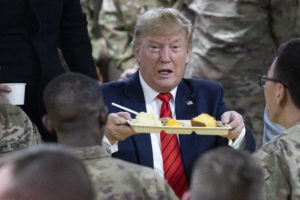
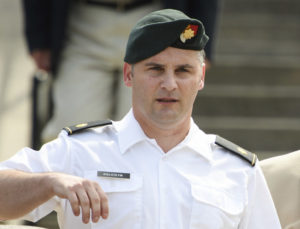
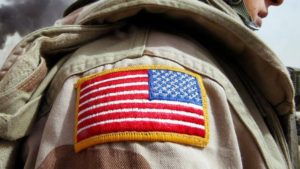
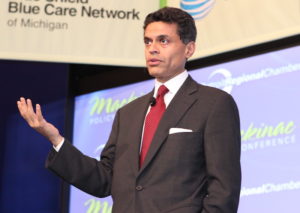
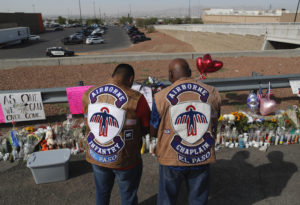
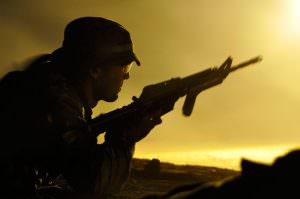
You need to be a supporter to comment.
There are currently no responses to this article.
Be the first to respond.